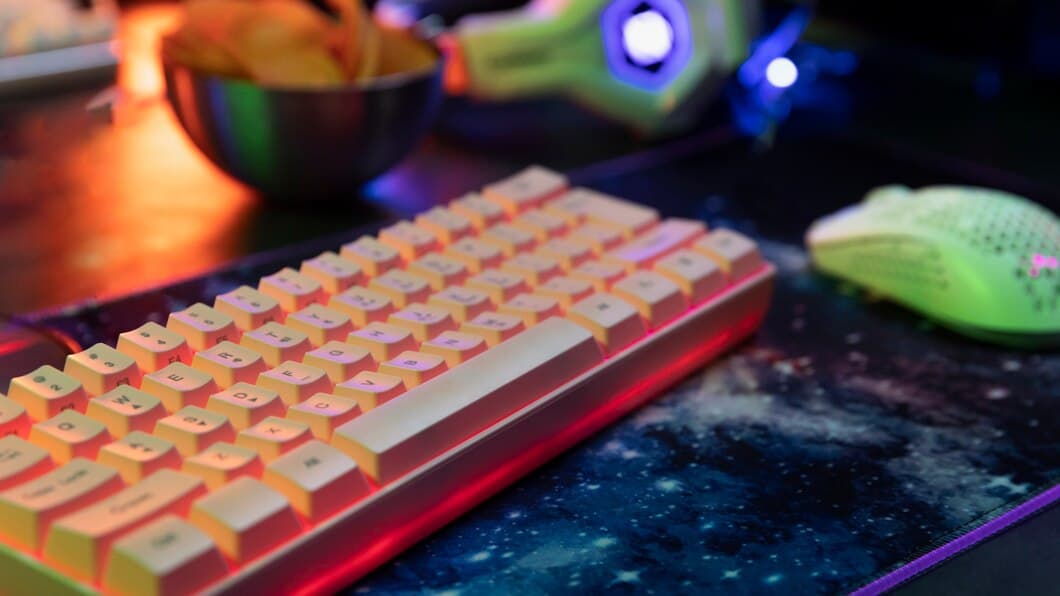Are Wireless Keyboards More Susceptible To Input Lag In Gaming?

Latency is an important factor to consider when gaming, as it can affect your performance and enjoyment. Wireless keyboards typically have higher latency than wired keyboards, which can be a disadvantage in competitive gaming. However, some wireless keyboards have been designed with low latency in mind, and these can offer a similar gaming experience to wired keyboards.
In this article, we will discuss the factors that affect latency in wireless keyboards and how they compare to wired keyboards. We will also provide some tips for choosing a wireless keyboard with low latency for gaming.
• Latency differences between wired and wireless keyboards
Wired keyboards provide a significantly lower latency compared to wireless keyboards, due to the lack of signal transmission delay. This delay, inherent in wireless communication, can lead to noticeable input lag, especially in fast-paced games where every millisecond counts. The wired connection of a wired keyboard eliminates this delay, allowing for a more responsive and consistent gaming experience.
The latency differences between wired and wireless keyboards can vary depending on the specific models and technologies used. However, in general, wired keyboards offer a more consistent and lower latency compared to wireless keyboards, making them the preferred choice for competitive gaming and other latency-sensitive applications.
While wireless keyboards have improved significantly in terms of latency in recent years, they still cannot compete with the low latency and reliability of a wired connection. For gamers who demand the best possible performance, a wired keyboard is still the way to go.
It is important to note that the latency of a wireless keyboard can also be affected by factors such as signal interference and distance from the receiver. To minimize latency, it is recommended to use the wireless keyboard in a clear line of sight to the receiver and to keep the distance between them as short as possible.
• Impact of wireless technology on input lag
Wireless keyboards transmit data to the computer using radio waves, which can introduce a slight delay compared to wired keyboards, a phenomenon known as input lag. The strength and stability of the wireless signal can play a crucial role in determining the severity of input lag. A weak or intermittent signal can result in more noticeable delays, potentially affecting the gaming experience.
Factors such as the distance between the keyboard and the computer, the presence of physical obstructions, and the presence of other wireless devices in the vicinity can all influence the signal strength and, consequently, the input lag. In general, wired keyboards tend to offer a more reliable and consistent connection, resulting in lower input lag compared to wireless keyboards.
• Factors affecting wireless keyboard latency
The latency of a wireless keyboard is affected by several factors, including the type of wireless connection, the distance between the keyboard and the receiver, and the presence of interference. A Bluetooth connection will typically have higher latency than a 2.4GHz wireless connection, due to the lower data rate and the frequency hopping nature of Bluetooth. The distance between the keyboard and the receiver can also affect latency, as the signal has to travel farther. Finally, the presence of interference from other wireless devices or even physical obstacles can cause the signal to be disrupted and increase latency.
The type of wireless connection used can have a significant impact on latency. Bluetooth is a common wireless technology that is used in many devices, including keyboards. However, Bluetooth is known to have higher latency than other wireless technologies, such as Wi-Fi or 2.4GHz wireless. This is because Bluetooth uses a lower data rate and a frequency hopping spread spectrum (FHSS) modulation scheme, which can introduce additional latency.
The distance between the keyboard and the receiver can also affect latency. The farther the keyboard is from the receiver, the weaker the signal will be. This can lead to increased latency, as the receiver will take longer to receive the signal from the keyboard. In addition, the presence of interference from other wireless devices or even physical obstacles can cause the signal to be disrupted and increase latency.
• Gaming performance with wireless keyboards

Wireless keyboards have become increasingly popular in recent years, as they offer a number of advantages over traditional wired keyboards. They are more portable, easier to use, and can be used with a variety of devices. However, there is one potential downside to wireless keyboards: they may be more susceptible to input lag in gaming.
Input lag is the delay between when a key is pressed and when the corresponding action is displayed on the screen. This can be a major problem in gaming, as it can make it difficult to react quickly to events and can lead to missed shots or other errors. Wired keyboards typically have very low input lag, as the data is transmitted directly from the keyboard to the computer. However, wireless keyboards rely on a radio signal to transmit data, which can introduce some delay.
The amount of input lag on a wireless keyboard will vary depending on a number of factors, including the type of wireless technology used, the distance between the keyboard and the computer, and the presence of other wireless devices in the area. Generally speaking, Bluetooth keyboards have higher input lag than Wi-Fi keyboards, and keyboards that are used at a distance from the computer will have higher input lag than keyboards that are used close to the computer. The presence of other wireless devices in the area can also interfere with the signal and increase input lag.
• Wired vs wireless keyboards for competitive gaming
Wired keyboards have been the standard for competitive gaming for years, due to their low latency and reliability. Wireless keyboards, on the other hand, have become increasingly popular in recent years, as they offer the freedom of movement and a more minimalist setup. However, there is still some debate over whether wireless keyboards are more susceptible to input lag in gaming.
There are a few factors that can contribute to input lag with wireless keyboards. One is the type of wireless connection used. Bluetooth connections are typically more prone to lag than 2.4GHz wireless connections, as they operate on a shared frequency band with other devices, which can cause interference. Another factor is the battery life of the keyboard. As the battery gets low, the signal strength can weaken, which can also lead to input lag.
• Advantages and disadvantages of wireless keyboards for gaming

• Choosing the right wireless keyboard for gaming
When choosing a wireless keyboard for gaming, latency is a key consideration. Input lag can significantly impact your gaming experience, so it's crucial to select a keyboard that minimizes this issue. Look for keyboards with low latency ratings, typically measured in milliseconds (ms). A lower latency rating indicates a faster response time, ensuring your keystrokes are registered quickly and accurately.
In addition to latency, consider other factors such as battery life, connectivity options, and ergonomic design. A long battery life ensures uninterrupted gaming sessions, while reliable connectivity prevents dropouts or interference. Ergonomic features, such as adjustable tilt and wrist rest, enhance comfort during extended gaming sessions.
• Tips for reducing input lag with wireless keyboards
Input lag can be extremely frustrating, especially during intense gaming sessions. The good news is that there are several things you can do to reduce input lag with a wireless keyboard. One is to make sure that your keyboard is using the latest firmware. Firmware updates often include improvements to latency, so updating your keyboard's firmware is a good place to start.
Another way to reduce input lag is to use a high-quality wireless connection. If your wireless connection is weak or unstable, it can cause input lag. To improve your wireless connection, try moving your keyboard closer to the receiver or using a USB extension cable to connect the receiver to your computer.
You can also try disabling any unnecessary software or services that may be running in the background. These programs can consume system resources, which can lead to input lag. To disable unnecessary software or services, open the Task Manager (Ctrl+Shift+Esc) and close any programs or services that you don't need.
Finally, if you're still experiencing input lag, you may need to adjust the settings in your game. Some games have settings that can be adjusted to reduce input lag. For example, you can try lowering the graphics settings or turning off certain visual effects.
• Future of wireless keyboard technology for gaming
The future of wireless keyboard technology for gaming looks promising. As technology continues to develop, we can expect to see even lower latency and more reliable wireless keyboards that are perfect for gaming. Some of the latest innovations in wireless keyboard technology include the use of faster wireless protocols, such as Wi-Fi 6 and Bluetooth 5.0, which can provide lower latency and more stable connections.
In addition, some manufacturers are also developing new technologies that can further reduce latency, such as proprietary wireless protocols and adaptive frequency hopping. These technologies can help to ensure that wireless keyboards can provide the same level of performance as wired keyboards, making them a viable option for even the most demanding gamers.
• Expert opinions on wireless keyboard input lag
Most wireless keyboards are designed to minimize input lag, but there are still some factors that can affect the latency of your connection.
One of the most important factors is the type of wireless technology that your keyboard uses. Bluetooth is a common wireless technology that is known for its low latency, but it can be affected by interference from other devices. Wi-Fi is another common wireless technology that is known for its high speeds, but it can also be affected by interference.
Another factor that can affect input lag is the distance between your keyboard and your computer. The further away your keyboard is from your computer, the longer it will take for your keystrokes to reach your computer. This can be a problem if you are gaming or doing other activities that require fast reflexes.
Finally, the type of keyboard you are using can also affect input lag. Mechanical keyboards are known for their low latency, but they can be more expensive than other types of keyboards. Membrane keyboards are less expensive than mechanical keyboards, but they have higher latency.
Frequently Asked Questions

Conclusion
Ultimately, the susceptibility of wireless keyboards to input lag in gaming depends on several factors. While some users may experience noticeable lag, others may find the difference to be negligible. Ultimately, the best way to determine if a particular wireless keyboard is suitable for gaming is to test it out for yourself.
If you are concerned about input lag, you can also look for keyboards that offer low-latency technology or that use a dongle instead of Bluetooth. These keyboards can minimize the amount of lag and provide a more responsive gaming experience.




